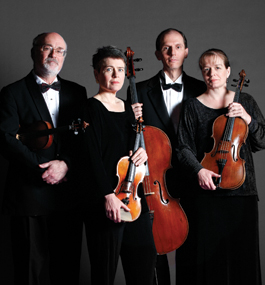The Lydians Turn 30
Brandeis' celebrated string quartet reaches an important milestone in perfect harmony.

Mike Lovett
Lydian musicians Daniel Stepner, Judith Eissenberg, Joshua Gordon and Mary Ruth Ray.
by Scott Edmiston
Pulitzer Prize–winning music critic Lloyd Schwartz called them “a resident string quartet of the highest quality and deepest integrity.” Alan Rich, in the Los Angeles Daily News, called them “one of the country’s superior chamber groups.” For three decades, the Lydian String Quartet has graced the Brandeis music faculty with its distinguished artistry and teaching while inspiring worldwide critical acclaim and developing a devoted New England audience.
The world has changed since Brandeis’ young resident musicians began performing in 1980. That year, Ronald Reagan was elected president, John Lennon was assassinated, and Brandeis itself was barely 30 years old. The quartet’s identity has changed, too. Founding members Judith Eissenberg (violin) and Mary Ruth Ray (viola) were joined in 1987 by violinist Daniel Stepner (replacing Wilma Smith) and in 2002 by cellist Joshua Gordon (replacing Rhonda Rider, who agreed to return as a guest artist for the ensemble’s 30th anniversary concert on March 26).
Eissenberg and Rider were graduate music students at Yale when they heard that Brandeis faculty member Robert Koff, onetime second violinist with the Juilliard String Quartet, was hoping to establish a similar resident ensemble at Brandeis. Eissenberg called Ray, with whom she had first played music at age 10 in an elementary school orchestra in Knoxville. Ray in turn contacted Smith, her colleague at the New England Conservatory of Music, and the foursome auditioned for and won the spot at Brandeis.
Although the job was one she calls “extremely part-time,” Eissenberg notes that the commitment of a liberal arts college like Brandeis to provide a home for a string quartet was an extraordinary one; more extraordinary still is the fact that the commitment endures after 30 years.
In the early days, Koff mentored the group during daily rehearsals, seven days a week, according to Eissenberg, who recalls, “We were brazen, innocent and ready to try anything. We made our mark by performing with clarity and precision. Later, Dan and Josh brought fresh perspectives and challenged the quartet to keep growing. Dan brings a passion and a sense of classical style; Josh brings a poetic eloquence and humor.”
The name Lydian refers to a musical scale pattern based on Greek modes, says Stepner, who notes that Plato once described the
Lydian mode as “dangerous and daring.” An apt descriptor, since the quartet has proved fearless in its willingness to explore new music; among its 25 CDs are many featuring contemporary Brandeis faculty composers such as Harold Shapero, Yehudi Wyner, Martin Boykan and Eric Chasalow.
But the Lydians are not all about pursuing the latest sounds. Their mastery of the great historical European repertoire, demonstrated in performances at Lincoln Center, the Kennedy Center and Boston’s Symphony Hall and in other venues around the globe, has earned international accolades, including the prestigious Naumburg Award for Chamber Music. Indeed, the ensemble’s forthcoming CD is a collection of Beethoven’s late string quartets — a standard of excellence by which a quartet is measured.
“We are practicing artists, and we bring that to our students every single day,” says Eissenberg, who also founded a program to bring world music to the Brandeis community and youth in the Waltham Public Schools. “On our music stands are the ideas of men and women from different times and places. These ideas, expressed in a special code of black marks on five lines, speak to some of the best of what it is to be human.”
Scott Edmiston is director of Brandeis University’s Office of the Arts.
